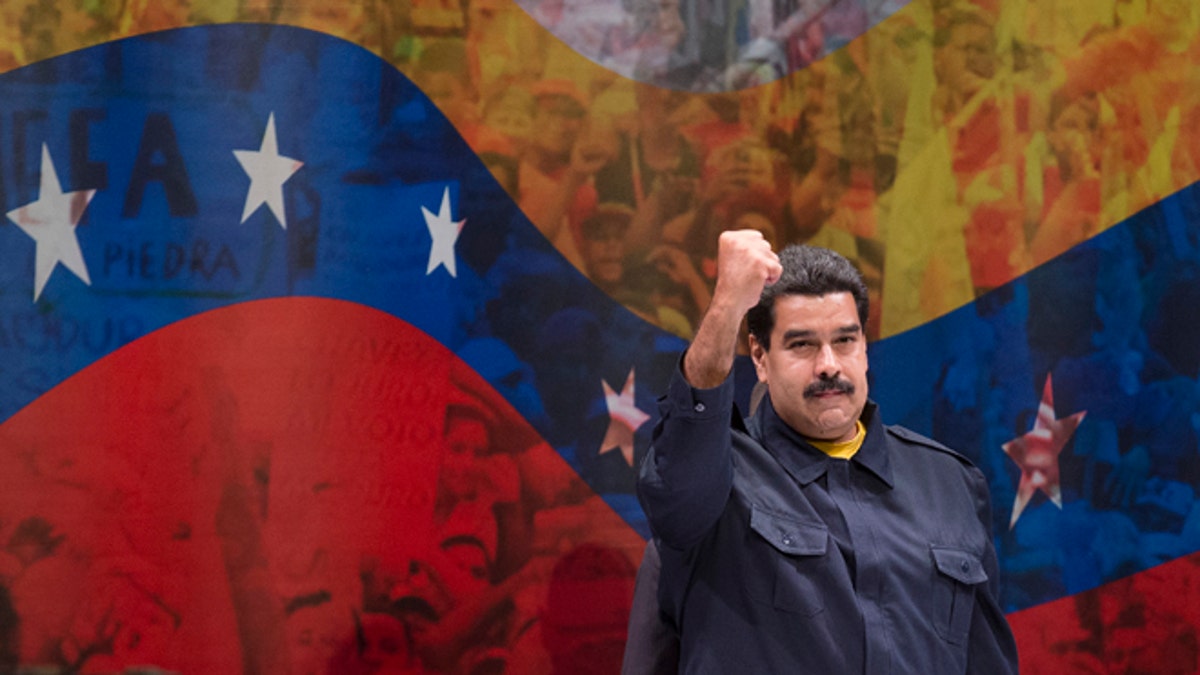
Nicolás Maduro, President of Venezuela, gestures to the crowd before he speaks at Hostos Community College as the United Nations General Assembly convenes, Tuesday, Sept. 23, 2014, in the Bronx borough of New York. (AP Photo/John Minchillo)
New York – Venezuelan President Nicolás Maduro, in his first appearance before the United Nations General Council, plans to make a concerted push on Wednesday for his socialist nation to win a seat on the Security Council.
Maduro, a year and a half into his term, arrived in New York with unanimous backing from Latin America and Caribbean nations to represent the region on the council beginning next year. The U.S. is uneasy with the nomination but says it has no plans to try to derail the bid, as it did in 2006.
The New York Times and Washington Post this week editorialized against Venezuela's membership on the U.N.'s highest body, citing criticism by human rights groups of Maduro's crackdown on anti-government protests earlier this year. Maduro called the editorials "racist" and denounced the newspapers for emphasizing his working-class roots as a bus driver.
Venezuela is expected to defend U.S.’ archenemies if it wins a seat on the council.
On Tuesday, following in the footsteps of his predecessor, the late Hugo Chávez, Maduro met with labor and peace activists at a Venezuelan-sponsored event in the South Bronx billed as an encounter with "the people's president."
- Shortages Shut Down Venezuela’s Oldest Newspaper, El Impulso
- U.S. Imposes Travel Ban On Venezuelan Officials Linked To Human Rights Abuses
- Sale Of Major Venezuela Newspaper Raising Questions On Freedom Of The Press
- Venezuela Evicts 3,000 Squatters From Famed ‘Tower Of David’ Skyscraper
- U.S. Arrests Venezuela’s Former Chief Of Intelligence And One-Time Judge For Drug Trafficking
- Miss Universe ‘Gagged In Venezuela’
Spanish-speakers dressed in the red of the Venezuelan revolution, baby boomers wore peacenik T-shirts and Bronx natives cheered as Maduro talked about the need for a new kind of world economy.
Maduro was the guest of honor, but it was Chávez's face that dominated the banners decorating the Hostos Community College auditorium. As Maduro took the stage, the crowd chanted, "Chávez, now and forever."
There's even a Chávez traveling in Maduro's entourage. In images beamed across Venezuela on Tuesday, he was greeted at New York's John F. Kennedy airport by María Gabriela Chávez, the late leader's favorite daughter and Venezuela's recently named deputy ambassador to the U.N.
Chávez's 2005 visit to the working-class neighborhood was followed by an influx in millions of dollars in Venezuelan charity and free heating oil. A decade later, the cash-strapped socialist government has a lot less of Venezuela's oil wealth to spread around as it battles food shortages and soaring inflation at home.
Though he lacks Chávez's charisma, Maduro seems at ease delivering the sort of tongue-lashing his mentor was famous for.
On Tuesday evening, he delighted the crowd with jokes about how President Barack Obama's security detail had caused him long waits in New York. It was a far cry from the confrontational flourishes of his predecessor, who famously quipped that "it still smells like sulfur" when following former President George W. Bush to the podium at the U.N. General Assembly in 2006.
At the Tuesday event, Joseph P. Kennedy II said people who say Venezuela is not a friendly country should consider its long history of selling oil to the U.S.
"They are a friend, and when they reach out their hand we can't slap it away," he said to cheers.
Earlier Tuesday, Maduro met with Iranian President Hasan Rohani to take stock of a strategic alliance that he helped establish as Chávez's longtime foreign minister.
President Barack Obama on Tuesday called for the release of one of Maduro's fiercest opponents, Leopoldo Lopez, who has been in jail since February awaiting trial on charges of inciting violence during the protests.
"We stand in solidarity with those who are detained at this very moment," Obama said in remarks at the Clinton Global Initiative, naming Lopez along with jailed activists in Cuba, Egypt, China and Burundi.
On Tuesday, Maduro set the audience stomping and pumping their fists in the air when he responded that there are more political prisoners in the U.S. than in his country.
Based on reporting by The Associated Press.
Follow us on twitter.com/foxnewslatino
Like us at facebook.com/foxnewslatino
